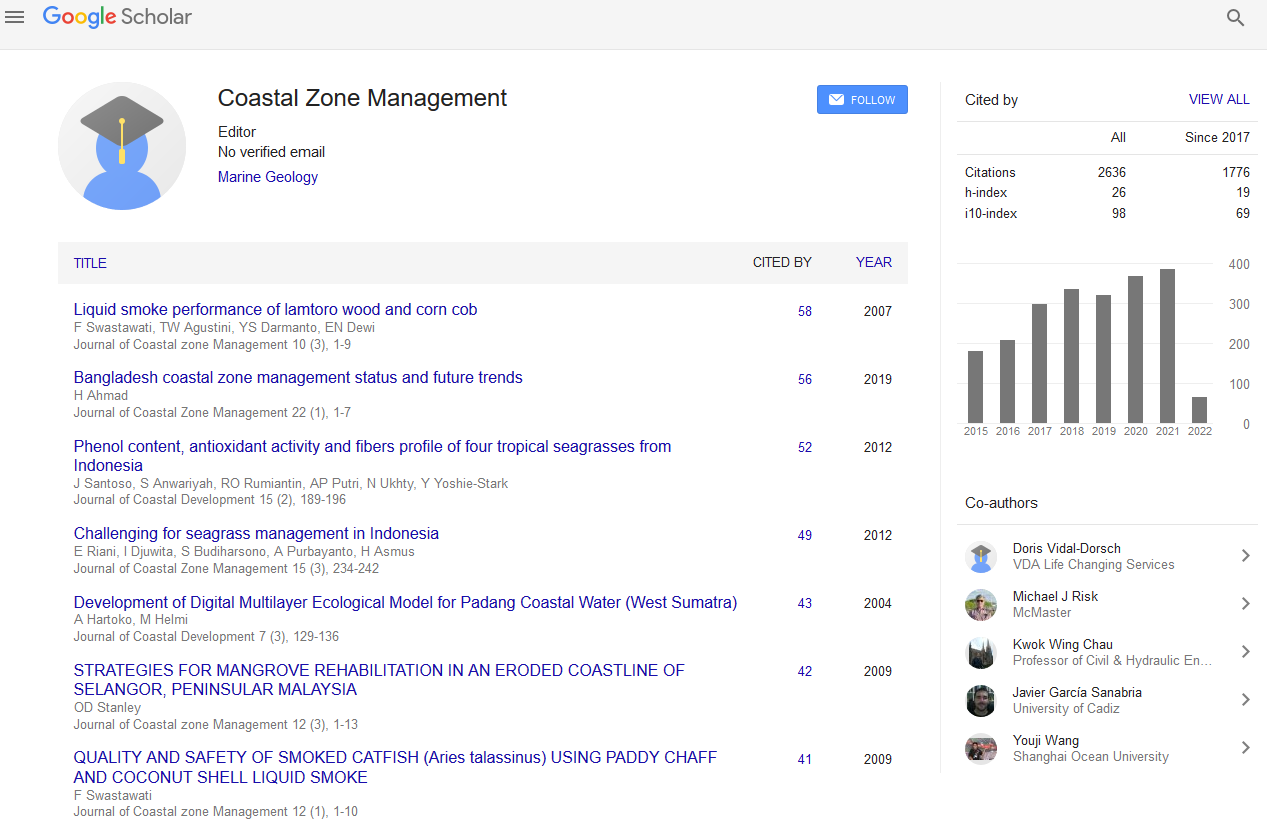Indexed In
- SafetyLit
- RefSeek
- Hamdard University
- EBSCO A-Z
- OCLC- WorldCat
- Publons
Useful Links
Share This Page
Journal Flyer

Open Access Journals
- Agri and Aquaculture
- Biochemistry
- Bioinformatics & Systems Biology
- Business & Management
- Chemistry
- Clinical Sciences
- Engineering
- Food & Nutrition
- General Science
- Genetics & Molecular Biology
- Immunology & Microbiology
- Medical Sciences
- Neuroscience & Psychology
- Nursing & Health Care
- Pharmaceutical Sciences
Coastal issues in southeast Asia including Myanmar and Thailand
2nd International Conference on Coastal Zones
July 17-18, 2017 Melbourne, Australia
Hugh Kirkman
The University of Western Australia, Australia
Keynote: J Coast Zone Manag
Abstract:
During 5 years as the director of the UNEP Coordinating Body of the Seas of East Asia I was commissioned to communicate directly with the directors of the departments of environment in ten countries. During this time I was able to discuss with relevant officials the various issues that had arisen in their countries. Of the ten, three were in COBSEA to offer skilled and professional assistance to COBSEA. The countries that required some assistance were: Cambodia, China, Indonesia, Malaysia, Philippines, Thailand and Viet Nam. I was required to assist with countries�?? strategic plans, produce a funding proposal worth $32 million for a Global Environment Facility project and help prepare proposals and projects for funding countries to conserve, restore and sustain coastal ecosystems. My research expertise had been in seagrass and this was, out of the three main ecosystems, of most interest, the least studied and known about. The other two were mangroves and corals. Mangroves in Thailand had been badly desecrated since the early seventies mainly for shrimp ponds and charcoal, while corals were damaged by destructive fishing such as using explosives to stun fish and poisoning fish. There were many successful efforts at restoring mangrove but few for corals. Many of these efforts were not recorded and the NGOs responsible had not left adequate or available records. The extent of seagrass and its use as nursery areas was not realised and the loss of this resource cannot be quantified until recent maps were produced. This talk is about my efforts to integrate activities to conserve the marine environmental conservation efforts and to obtain funding for marine conservation and protection. It also attempts to point out the problems with maintaining sustainable resources from a limited supply. At the time of my work with UNEP, Myanmar was not a member of the United Nations so it was not until recently that I had an idea of the main coastal issues there. Myanmar is undergoing now similar exploitation and abuse of the marine environment that the other Southeast Asian countries were experiencing 40 years ago. Overexploitation of fisheries is now documented and scientists and environmental groups are beginning to realise the damage that has occurred and now continues.
Biography :
Hugh Kirkman has more than 37 years of marine research experience. He is a world authority on seagrass ecology and biology and completed a Ph.D. on seaweed. He has published 44 scientific papers in international journals, nine book chapters and nearly 50 reports. He has experience in marine systems and processes throughout Australia and has worked in many overseas countries. His scientific flexibility is reflected by his having published a number of papers on fauna in seagrasses, physiology in seaweeds and a proposal for growing trees in treated sewage. He also co-authored a paper on the effects of megacities on the marine environment and a review of the UNEP Regional Seas Programme.
Email: hughkirkman@ozemail.com.au

